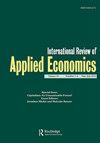Gender and corruption: examining the nexus in MENA countries using PMG-ARDL approach
IF 1.4
Q3 ECONOMICS
引用次数: 0
Abstract
ABSTRACT This paper investigates the relationship between gender and corruption in thirteen Middle East and North African (MENA) countries during 2006–2020. We find a poor performance in terms of both corruption and the lack of involvement of women in public life, with a correlation between these two phenomena in the region. Due to the presence of cross-sectional dependence and heterogeneity in the panel, we employed second-generation econometric panel unit root and cointegration tests. Using the ARDL-PMG approach, which is categorised as an error-corrected model, we demonstrate that greater involvement of women in the economic and political sphere is associated with lower levels of corruption. The results also indicate that the link between corruption and gender is dependent on the context and institutional factors. The role of democracy and political stability in explaining this interaction is particularly important, especially when women are well-represented in decision-making positions. Finally, we provide evidence that improved gender equality can strengthen the connection between greater involvement of women in public life, and more success in tackling corruption. Greater gender egalitarianism can break down the male-dominated network of corruption that is widespread in MENA countries.性别与腐败:使用PMG-ARDL方法审查中东和北非国家的联系
本文研究了2006-2020年间13个中东和北非国家的性别与腐败之间的关系。我们发现,在腐败和缺乏妇女参与公共生活方面,该地区表现不佳,这两种现象之间存在相关性。由于面板中存在横断面依赖性和异质性,我们采用了第二代计量面板单位根和协整检验。使用被归类为纠错模型的ARDL-PMG方法,我们证明了妇女更多地参与经济和政治领域与较低的腐败水平有关。结果还表明,腐败与性别之间的联系取决于环境和体制因素。民主和政治稳定在解释这种相互作用方面的作用尤其重要,特别是在妇女在决策职位上有充分代表的情况下。最后,我们提供的证据表明,改善性别平等可以加强妇女更多地参与公共生活与更成功地打击腐败之间的联系。更大程度的性别平等主义可以打破在中东和北非国家普遍存在的男性主导的腐败网络。
本文章由计算机程序翻译,如有差异,请以英文原文为准。
求助全文
约1分钟内获得全文
求助全文
来源期刊

International Review of Applied Economics
ECONOMICS-
CiteScore
4.30
自引率
4.50%
发文量
37
期刊介绍:
International Review of Applied Economics is devoted to the practical applications of economic ideas. Applied economics is widely interpreted to embrace empirical work and the application of economics to the evaluation and development of economic policies. The interaction between empirical work and economic policy is an important feature of the journal. The Journal is peer reviewed and international in scope. Articles that draw lessons from the experience of one country for the benefit of others, or that seek to make cross-country comparisons are particularly welcomed. Contributions which discuss policy issues from theoretical positions neglected in other journals are also encouraged.
 求助内容:
求助内容: 应助结果提醒方式:
应助结果提醒方式:


